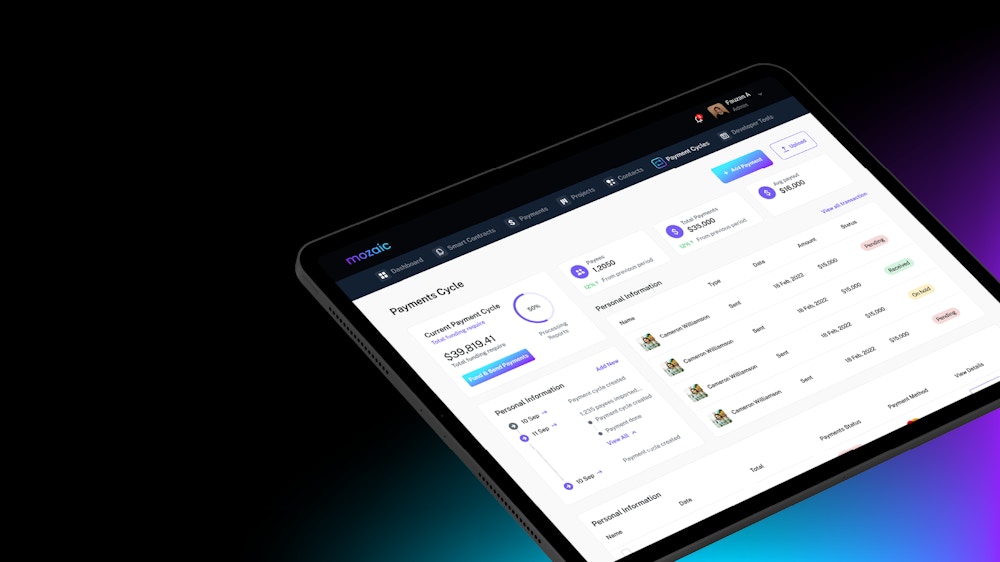The Creator Economy Explosion
It’s no secret that jobs in the creator economy, and gig economy more broadly, have exploded in popularity following COVID-19 / The Great Resignation and have fundamentally reshaped the way people generate income. Despite this popularity, however, payment innovation in these categories has lagged – making it difficult for these jobs to suffice as full-time income sources in the way that many desire.
Specifically, payment flows tend to break down when there are numerous parties or co-creators involved that need to be paid, which is quite typical of jobs in the gig industry. Collaborating with others in creative projects is common, but splitting income across collaborators has proven to be a major challenge. As such, we are thrilled to announce our $20M Series A investment in Mozaic, a global payments platform making multi-party payouts seamless and automated for the creator economy and beyond.
Collaborative Work Creates Complexity in Compensation
Although creators, gig workers, and freelancers are often self-employed, they typically do not work in complete isolation. Rather, they interact with many parties who collaborate with them on their projects and are ultimately owed compensation for their contributions. In the music industry, as an example, there might be collaborators like back-up singers, graphic designers, producers, sound and technical professionals, etc. who help a lead artist create their song – all of whom are owed compensation when that song is streamed.
This dynamic exists not just in music but for everyone from Tik Tok creators to YouTube artists to Twitch streamers to Etsy store owners and many others. The common thread in each of these scenarios is a complex web of payment models that can differ by content type, content version, distribution channel, and geography which can lead to slow and inaccurate payments for collaborators.
Current Payment Solutions Leave Much to be Desired Within Multi-Party Work
For those employed in traditional corporate jobs, a biweekly or monthly paycheck hitting their bank account is not abnormal, it’s customary. For creators and gig workers, on the other hand, routine and automated payments are a luxury they currently do not have. Why is this the case?
Payments for work in these industries are generally sent as a lump-sum to the point person for the project (i.e., lead artist, head event planner, general contractor). From there, the responsibility lies with this point person to split the funds across all involved parties. The process begins with tedious calculations around who is owed what amount, often referencing excel sheets and ad-hoc agreements. Peer-to-peer payment platforms such as Venmo and Cash App are then commonly used to send the allocated funds.
The errors, delayed payments, and overall lack of transparency that result from these manual transactions are a critical inhibitor to growth for the majority of creatives and gig workers – particularly for those who are seeking full-time income from this type work (Mastercard Gig Economy Report & Tipalti).
Enter Mozaic
When the Volition team first met with Mozaic’s Co-Founders, Marcus Cobb and Rachel Knepp, it was clear they had found a solution to the acute pain felt in the multi-party payment ecosystem. They have taken a user-first approach since the beginning, working through a series of feedback-driven iterations to arrive at the Mozaic we are investing in today. At its core, Mozaic automates income splitting. Its proprietary technology architecture ingests sales reports/invoices, calculates each party’s owed amount, and pushes payments directly to bank accounts; this is an instantaneous process, eliminating the need for manual calculations, excel trackers, and Venmo/Cash App usage.
The company’s first use case was splitting royalties in the music industry, which is a notoriously complex process given the multiple types of royalties that exist, the sheer volume of parties involved in releasing a singular song, and the industry’s overall slow tech adoption. Quickly, however, customers began to pull Mozaic horizontally into new use cases across the creator and gig economies such as for YouTube, podcasting, gaming, and healthcare projects. We were impressed by this organic market expansion as an indicator of the platform’s transferability across industries with similar pain points and its legs for future expansion.
In less than two years in operation, Mozaic has reached a remarkable scale on the back of nominal sales and marketing spend which has clearly demonstrated product-market fit to us. The platform now processes hundreds of thousands of payouts each month and given the network effects of collaboration, user growth has been exponential. Mozaic is integrated with several creative platforms today such as Spotify, YouTube, Etsy, Shopify, and Twitch with a robust pipeline for future integration development.
And, most importantly, we are excited to back Marcus and Rachel on their growth journey. The two have led the organization with a strong consumer and user-first mentality, and we are thrilled to help them continue to rapidly expand as they become the de facto payment solution for creatives. We look forward to the journey to come and welcome the Mozaic team to the Volition family.
-Larry, Emily, Carolyn



